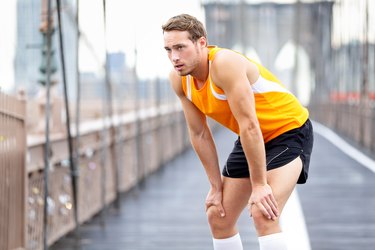
One tequila, two tequila, three tequila … gym? "Sweat it out" is a common phrase we hear from those trying to mask a massive hangover or detox toxins after a heavy meal. But is that the right prescription for your body?
The opinions and research vary. According to an August 2016 study in the British Journal of Sports Medicine, physical activity can help offset some cancer and cardiovascular mortality risk associated with alcohol consumption.
Video of the Day
Video of the Day
But some experts say post-drinking may be the perfect time to skip physical activity, depending on when you're trying to get after it. Here, why you should hold off and smarter tips for beating that less-than-stellar feeling.
1. Sweating Will Only Make You More Dehydrated
"I don't recommend performing moderate to intense workouts on hungover days," says Rick Rutkowski, CSCS, certified strength and conditioning specialist and founder of The Body Lab in New Jersey. Under these circumstances, working out dehydrated, tired and weak can create potentially damaging consequences for the body, he adds.
"The actual act of sweating out alcohol or toxins, secretes these toxins through sweat, skin and breath, which is only going to make you more dehydrated," says Rutkowski. If you do anything, he suggests light exercise and as much water as possible the following day.
Think you're fine? Before you sweat, do a urine check. If your urine is yellow instead of almost clear and your skin is dry, then you're dehydrated and should sit the exercise out.
2. You Haven't Had a Good Night's Rest
Most hangovers come with less, restless sleep. One November 2015 study in the Korean Journal of Family Medicine showed increased alcohol use is associated with poor quality shut-eye. "Don't physically challenge your central nervous system under those conditions," Rutkowski says. "That's just asking for an injury."
Lack of sleep from large amounts of alcohol can also impede muscle recovery and other physical restorative functions that happen during slumber, according to an April 2013 study in Alcoholism: Clinical and Experimental Research. Aim to get 7 or more hours per night, per the Centers for Disease Control and Prevention (CDC), especially before a workout.
3. You're Likely Low on Electrolytes
With dehydration also comes a loss of electrolytes and sodium in the body, according to the CDC. This absence can cause muscle contractions, cramps and potentially lead to injury, Rutkowski says.
"Four drinks could be equal to one quart of fluid loss," he says. "So you have to make up for that and the electrolyte imbalance and loss of sodium, which can negatively affect muscle contraction when working out."
Remember: Too much water when you're dehydrated can cause you to lose valuable electrolytes, which your body really needs. Instead, drinking sports drinks can help replace those electrolytes while hydrating your body.
Try this equation for how much water to drink: Divide your body weight (in pounds) by 2 for the minimum ounces of water to have per day. (Remember, 8 ounces is 1 cup.)
4. Your Digestion is Out of Whack
If your usual cure for a hangover is a greasy meal, you may want to reconsider. A big meal can be a disaster before a workout, says registered dietitian Melissa Rifkin, RD.
"It will leave you more sluggish and dehydrated because of the high sodium intake," she says. "Not only could eating something that high in saturated fat be bad for cardiac issues, but that fat takes a long time to digest. Not exactly ideal for a workout."
To add insult to injury: Drinking suppresses the release of hormones that send a message to your kidneys to retain fluid, causing you to pee more often, according to the National Institute on Alcohol and Substance Abuse. This can lead to dehydration, Rifkin says. "Coupling that with exercise makes the kidneys and body work in overdrive," she adds.
Instead, look to consume a healthy meal that will pack in macronutrients and micronutrients. Rifkin suggests egg whites, whole-grain toast, avocado and an orange.
What About Non-Exercise Sweating, Like a Sauna?
Sometimes sweating feels right after a big night out, but you're not really in the mood to put in the work. But Rutkowski advises against spending time in a sauna, as well.
"Saunas are another negative thing to do the day after drinking," he says. "You do not want to sweat it out in that environment; it will only make you more dehydrated."
Warning
Dizziness, shaking, nausea, vomiting or a bad headache are all signs that you need to stop any workout you're doing ASAP.
- British Journal of Sports Medicine: "Does physical activity moderate the association between alcohol drinking and all-cause, cancer and cardiovascular diseases mortality? A pooled analysis of eight British population cohorts"
- Korean Journal of Family Medicine: "The Effects of Alcohol on Quality of Sleep"
- Alcoholism: Clinical and Experimental Research: "Alcohol and sleep I: effects on normal sleep"
- Centers for Disease Control and Prevention: "How Much Sleep Do I Need?"
- Centers for Disease Control and Prevention: "Hydration"
- National Institute on Alcohol Abuse and Alcoholism: "https://www.niaaa.nih.gov/publications/brochures-and-fact-sheets/hangovers"
- Get the Facts: Drinking Water and Intake
- Does physical activity moderate the association between alcohol drinking and all-cause, cancer and cardiovascular diseases mortality?
- How Much Sleep Do I Need?
- Alcohol and sleep I: effects on normal sleep
Is this an emergency? If you are experiencing serious medical symptoms, please see the National Library of Medicine’s list of signs you need emergency medical attention or call 911.